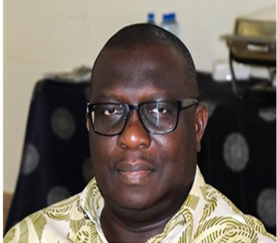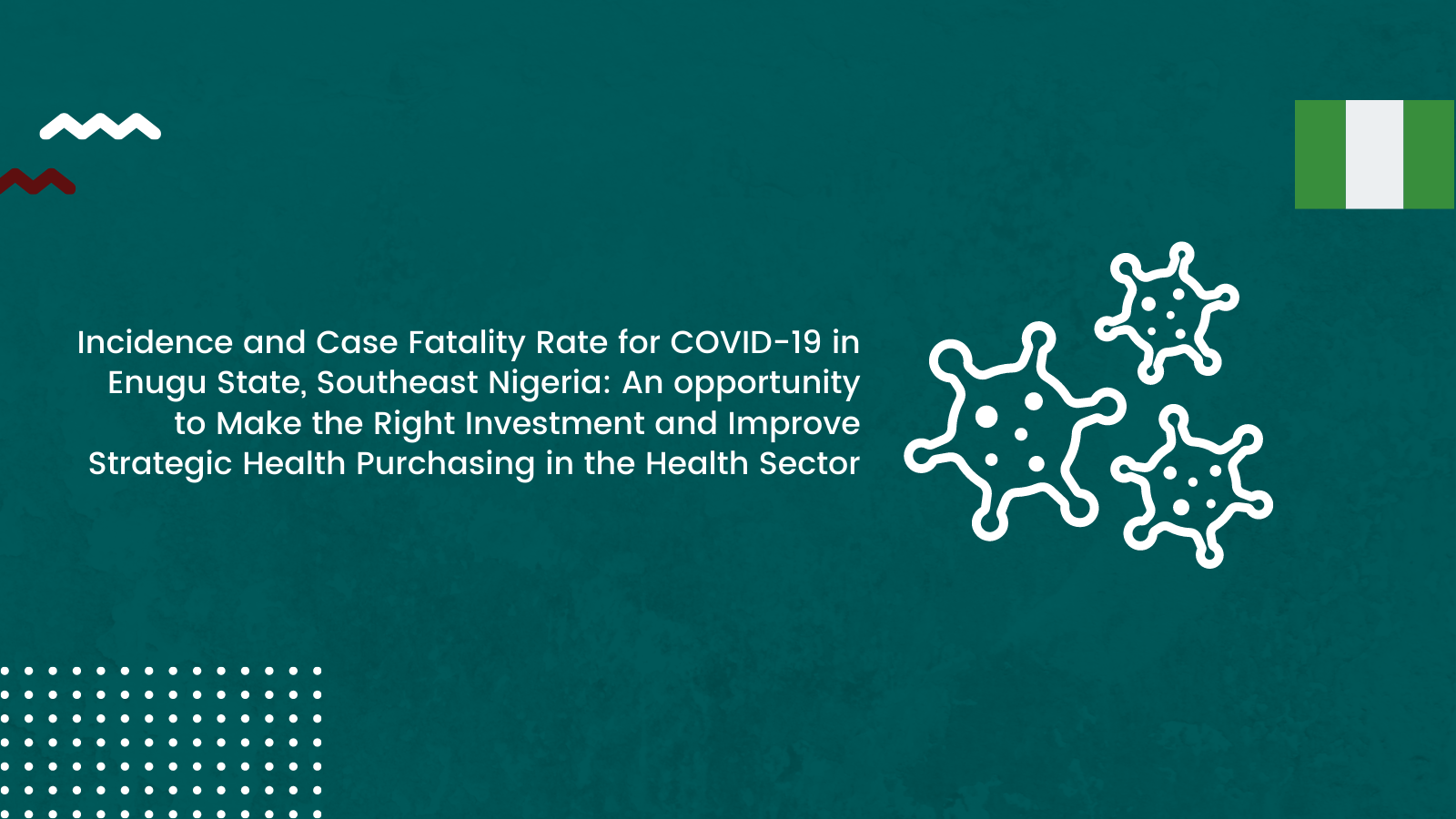A novel severe acute respiratory syndrome coronavirus-2 (SARS-CoV-2) known to be responsible for an infectious disease called coronavirus disease 2019 (COVID-19) was first identified and reported from Wuhan city of China in December, 2019 [1]. SARS-CoV-2 is highly contagious, spreading globally in a very short period of time, and was declared a global pandemic by the World Health Organization on March 11, 2020 [2]. Since then the number of cases continues to rise throughout the globe and has become a serious menace to public health [3]. Africa confirmed its first case of COVID-19 in Egypt on 14th of February, 2020, and Nigeria reported the first on 27th of February [4, 5]. Enugu State recorded its first two (2) cases on March 28th, 2020 [6] and the spread of the virus has been steadily rising in the state.
Rising number of confirmed cases
In mid-August 2020, while Nigeria as a country had registered 54,000 COVID-19 confirmed cases and 987 case fatalities; Enugu State recorded a total of 976 COVID-19 cases, 19 deaths, 650 discharged patients and 307 cases on treatment. Enugu state has a crude case fatality rate of 1.95% for COVID-19 as at mid-August 2020. Between February and August 2020, the COVID-19 associated fatality rate increased possibly as a result of the moderately weak health systems of Enugu State characterized by inadequate equipment, low public financing and a high burden of infectious diseases (such as TB, HIV, Malaria).
Preventing the spread of COVID-19
The initial strategy adopted by Enugu state was to prevent COVID-19 spread by closing its border with all neighboring states, restrict movement and close markets, offices and all public places. The state also promoted containment strategies designed to prevent community transmission such as prompt contact tracing and quarantine. The state also used non-pharmaceutical interventions (NPIs) such as hand and respiratory hygiene, travel restrictions, school closures, social distancing, etc. As early as March 31st 2020, the state directed all political appointees’/office holders, traditional rulers, town unions leaders, religious leaders and other stakeholders in the state to embark on massive mobilization and sensitization campaigns on preventive and precautionary measures against the spread of COVID-19 in the state. Large gatherings, festivals, conferences, and sporting events were all put on hold.
Enugu State Government set up a ministry of health COVID-19 response team, State Emergency Committee (EOC) and COVID-19 Multi-Sectoral Rapid Response Team and adopted all the guidelines developed by the Nigeria Centre for Disease Control (NCDC), for their operations. The state built and/or equipped three treatment/isolation centres. Contracts for the immediate massive construction of 7 units of type-3 Primary Health Care Centres were awarded. Three district hospitals were upgraded and rehabilitated, and 34 health centres reconstructed and equipped.
To cushion the effect of the COVID-19 pandemic on residents, the government granted different types of tax relief and incentives to taxpayers in the state. The state’s efforts were supported by development partners including United Nations children’s fund COVID-19 community sensitization campaigns as part of the Integrated Child Protection Program [7], and Interswitch Group’s donation of 1,500 rapid diagnostic test kits [8].
Weaknesses and systemic risks in health systems
In spite of all the above efforts, some weakness and systemic risks in Enugu State’s financial management were observed in the course of the government’s interventions and handling of the COVID-19 pandemic. These include limited financial in-formation disclosure, high administrative cost, significant delays in transfer of funds from state to healthcare providers, significant re-source leakages and occasional misuse of public funds, ineffective and inefficient fund management, and the fact that health programs are often not prioritized in the government budget [10].
Thus, there is need to identify policies that can help to improve transparency and accountability, and build resilience in the state’s health system and economy post COVID-19. The range of measures and policy options that can help the state to actualize strategic purchasing in its health system include:
- Operationalization of benefits
- Payment methods that need to be adjusted and aligned on regular basis
- Use of appropriate data and information management for purchasing decisions
- Putting in place an effective governance arrangement
- Ensuring reasonable adherence and implementation of health budget.
Way forward for Enugu State
The coronavirus pandemic (COVID-19) poses unprecedented challenges for governments and societies around the world [9] and Enugu State is not an exception. One clear message is that the Enugu State health system, like most healthcare systems, was not designed to deal with a crisis such as COVID-19 pandemic or an unpredictable, large-scale health challenge that requires urgent mobilization of resources and affects the whole population. However, this is an opportunity for health policy makers and the public health community in the state to press home on the need for more appropriate investment in the health sector, and the need to adopt strategic health purchasing in the health system. The COVID‑19 pandemic has brought about some significant lessons for stakeholders. The manner with which Enugu State responded to the pandemic has highlighted the need for early preparation and a clear definition of institutional responsibilities in the state even before any future epidemic situation. To ensure cost-effectiveness and efficiency in tackling COVID-19 pandemic or any epidemic, the government needs to clearly spell out the health services and palliative packages for vulnerable populations. This will encourage compliance to all the preventive measures that may be put in place.
The involvement of various sectors and stakeholders in tackling COVID-19 pandemic may have succeeded in focusing the attention of policymakers and governments towards making the right investments in the health sector. Hopefully, the policy entrepreneurs and public health community at large should not miss this important policy window to raise the level of advocacy for a much more targeted investment in the health sector. Strategic health purchasing measures such as output based payment system and other basic economic principles for purchasing healthcare should be maximized for the benefit of the population’s health. The management of COVID‑19 pandemic in Enugu State should continue to involve all stakeholders and relevant sectors of government. In the long run, the lessons learnt from the handling of COVID‑19 pandemic will act as enabler for building of a resilient public sector driven health services. Finally, it is important to note that one of the sure ways to reduce the total health impact of COVID-19 is to develop public health messages which are co-beneficial for protecting against COVID-19 and still encourage the primary and secondary prevention of other infectious diseases and non-communicable diseases. It is good to end with a note of optimism, recognizing the COVID-19 crisis as an opportunity for policymakers, health multilaterals, other development partners, and the broader global health community to reinforce the centrality of sustainable, efficient, and coherent health systems in attaining better health for all [11].
References
1. Du Toit A. Outbreak of a novel coronavirus. Nat Rev Microbiol. 2020; 18:123. doi:10.1038/s41579-020-0332-0.
2. World Health Organization Report of March 11, 2020.
3. Coronavirus disease (COVID-19) outbreak situation. Geneva: World Health Organization, 2020 [cited 2020 Apr 3]. Available from: https://www.who.int/ emergencies/diseases/novel-coronavirus-2019).
4. WHO. (2020). COVID-19 cases top 10,000 in Africa. [cited 2020 Apr 18]. Available from: https://www. afro.who.int/news/covid-19-cases-top-10-000-africa.
5. NCDC. (2020). First case of corona virus disease confirmed in Nigeria. [cited 2020 Mar 11]. Available from: https://ncdc.gov.ng/news/227/first-case-ofcorona-virus-disease-confirmed-in-nigeri.
6. Samson Ezea.Nigeria: Enugu Govt’s Proactive Responses to Spike in COVID-19 Cases. This Day (Lagos); 30 June 2020; https://allafrica.com/stories/202006300162.html.
7. Anukwuoji R. COVID-19: UNICEF takes integrated child protection to Royal Fathers in Enugu. Bussinessday; Jun 16, 2020.
8. Jumoke Akiyode-Lawanson. Businessday Nig. Interswitch Group wades in with Covid-19 relief in Enugu State; On May 31, 2020. https://businessday.ng/news/article/interswitch-group-wades-in-with-covid-19-relief-in-enugu-state/.
9. R. M. Anderson, H. Heesterbeek, D. Klinkenberg, T. D. Hollingsworth, How will country-based mitigation measures influence the course of the COVID-19 epidemic? Lancet. 395, 931–934 (2020).
10. D. C. Ogbuabor and O. E. Onwujekwe. Aligning public financial management system and free healthcare policies: lessons from a free maternal and child healthcare programme in Nigeria, Health Economics Review (2019) 9:17 https://doi.org/10.1186/s13561-019-0235-9
11. Center for Global Development. The economic impact of COVID-19 in Africa: A round-up of this week’s analysis. [cited 2020 Apr 13]. Available from: https:// www.cgdev.org/blog/economic-impact-covid-19-africa-weeks-latest-analysis.
AUTHORS

Professor Benjamin S.C. Uzochukwu is a Public Health Physician at the University of Nigeria Teaching Hospital Enugu and Professor of Public Health, Health Policy and Systems, University of Nigeria, Nsukka where he was the founding Director of the Institute of Public Health. He is the National President of the Association of Public Health Physicians of Nigeria (APHPN), Director of Grants and Research West African College of Physicians (WACP) and member of the Ministerial Expert Advisory Committee on COVID-19 Health Sector Response (MEACoC).

Obinna Onwujekwe is a Professor of Health Economics, Systems and Policy, and the Director of the Directorate for Research in the University of Nigeria, Nsukka. He is the founder and Director of the Health Policy Research Group, which is a renowned and reputable research organization. He has led the development of many health policies in Nigeria, including the National Health Policy (2016) and the National Health Financing Policy (2016). He has served on the scientific and advisory boards of the African and International Health Economics.

Henry Aloh, Director, Department of Health Services, Alex Ekwueme Federal University Ndufu-Alike; Research Fellow Health Policy Research Group, University of Nigeria

